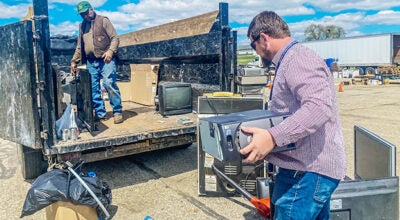AG: Trump opioid health emergency declaration will save lives, help Michigan
Published 10:18 am Wednesday, November 1, 2017
WASHINGTON, D.C. – Michigan Attorney Bill Schuette joined President Donald Trump at the White House last week as the president announced that he is mobilizing his entire administration to address drug addiction and opioid abuse by directing the declaration of a Nationwide Public Health Emergency to address the opioids crisis.
As one of the guests at The White House for the announcement, Schuette had the opportunity to discuss significant toll that opioid addiction and overdosing has had in Michigan with members of the Trump administration.
“The volume of opioid addiction and overdose in Michigan is staggering. The declaration made today by President Trump is an important step in the fight against opioid addiction,” said Schuette. “We see the effects of opioid addiction across Michigan, and it is taking a toll on our families, our workforce and the resources of our emergency services.”
With the declaration, expanded access to telemedicine services, including services involving remote prescribing of medicine commonly used for substance abuse or mental health treatment will be available. The directive will also assist in overcoming bureaucratic delays and inefficiencies in the hiring process, by allowing the Department of Health and Human Services to more quickly make temporary appointments of specialists with the tools and talent needed to respond effectively to our Nation’s ongoing public health emergency.
The action also allows the Department of Labor to issue dislocated worker grants to help workers who have been displaced from the workforce because of the opioid crisis, subject to available funding.
“Pushing aside bureaucratic delays and inefficiencies will help Michigan residents coping with addiction get the rehabilitation and medical services they need faster than ever before,” Schuette said. “High quality treatment for those suffering from addiction is the only proven way to break the cycle of addiction. This is what Michigan needs to slow the ever increasing number of opioid overdoses in our cities, towns and rural areas.”
Since Trump took office, more than $1 billion in funding has been allocated or spent directly addressing the drug addiction and opioid crisis. In April 2017, the U.S. Department of Health and Human Services announced the first round of grants to combat addiction, with Michigan being awarded $16.3 million.
Schuette has been a strong voice in Michigan in the fight against opioid addiction and trafficking, he said. In his time as attorney general, Schuette has made reducing the availability of opioids and increasing the availability of high quality treatment a priority.
According to statistics from the Michigan Department of Health and Human Services, approximately 1,365 people died as a result of an opioid overdose in 2016, compared to 884 in 2015 and 426 in 2012, meaning Michigan’s overdose rate has tripled since 2012.
Opioids, both prescription and illicit, are now the main driver of drug overdose deaths nationwide. According to CDC, opioids were involved in 33,091 deaths in 2015, and opioid overdoses have quadrupled since 1999.
Last week, Schuette joined a bipartisan group of attorneys general from 17 states as well as the District of Columbia and U.S. Virgin Islands to call on more than a dozen health care companies that provide pharmacy benefit management (PBM) services to implement programs to reduce prescription opioid abuse. During today’s address, the President endorsed this proposal.
In September, Schuette joined a bipartisan coalition of 41 state attorneys general in an investigation of both the manufacturers and the distributors of prescription opioid drugs.
The attorneys general are actively investigating the following pharmaceutical manufacturers and their related entities:
• Endo International plc
• Janssen Pharmaceuticals
• Teva Pharmaceutical Industries Ltd./Cephalon Inc.
• Allergan Inc.
• Purdue Pharma
The attorneys general are also seeking documents and information about distribution practices from the following medical prescription distribution companies, who together manage approximately 90 percent of the nation’s opioid distribution:
• AmerisourceBergen
• Cardinal Health
• McKesson
The investigation is ongoing.
On Oct. 4, Schuette joined another bi-partisan coalition of Attorneys General asking Congress to change federal law to make treatment for opioid addiction more affordable and accessible. The coalition of Attorneys General sent a letter to the U.S. House of Representatives regarding HR 2938, the “Road to Recovery” Act, asking Congress to allow for Medicaid to pay for large, residential addiction treatment facilities, opening new avenues for addiction treatment while maintaining appropriate restrictions on mental health facilities. During the President’s address today, he specifically mentioned lifting the prohibition on 16 or more bed facilities to provide treatment for those in need.
A key part of the Department’s Criminal Division, Schuette’s Opioid Trafficking and Interdiction Unit is comprised of four assistant attorneys general, each with extensive backgrounds in drug crime prosecution. The unit is focusing on cases that cross both state and county lines, involve multiple major actors, and high volumes of heroin and other opioid-based drugs.
The unit has already taken on nearly 50 cases, with multiple convictions and more than a dozen currently facing charges.
The cases have been and will continue to be charged in cooperation with local law enforcement, Michigan State Police narcotics teams and federal agencies. The unit has also taken on felony murder cases in which it is alleged that the delivery of opioids has caused death.






